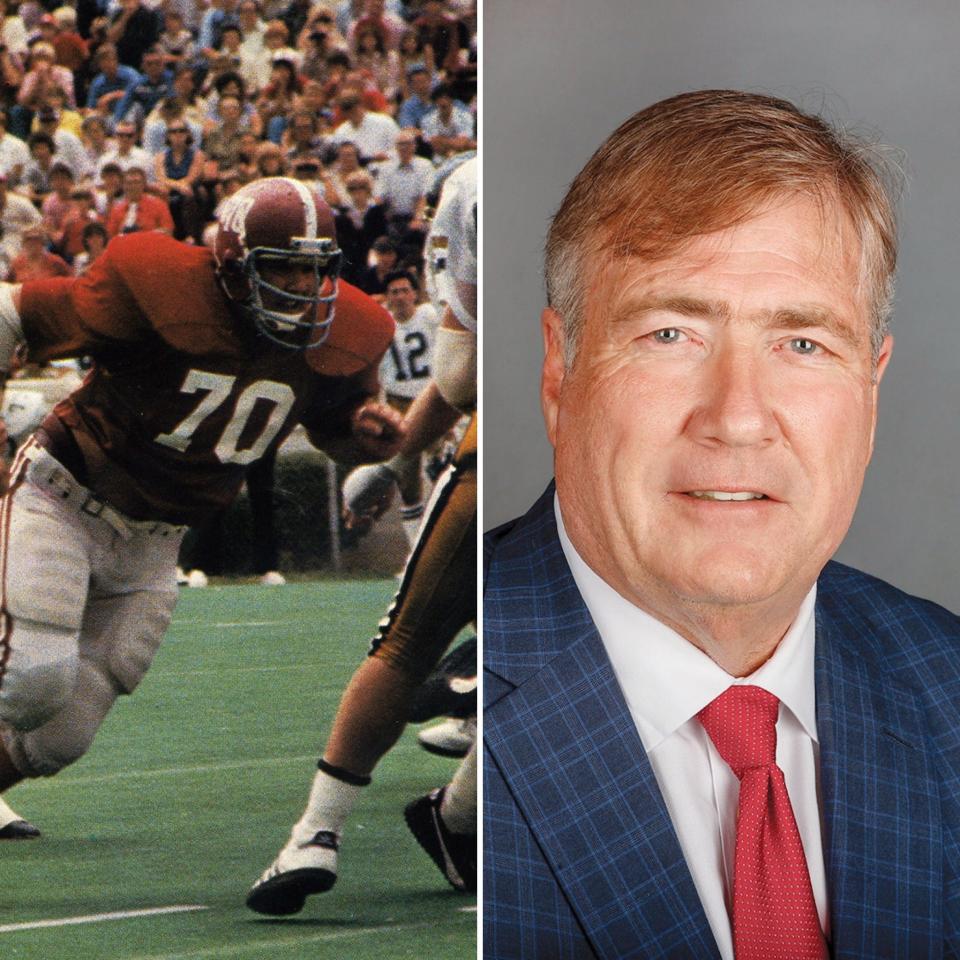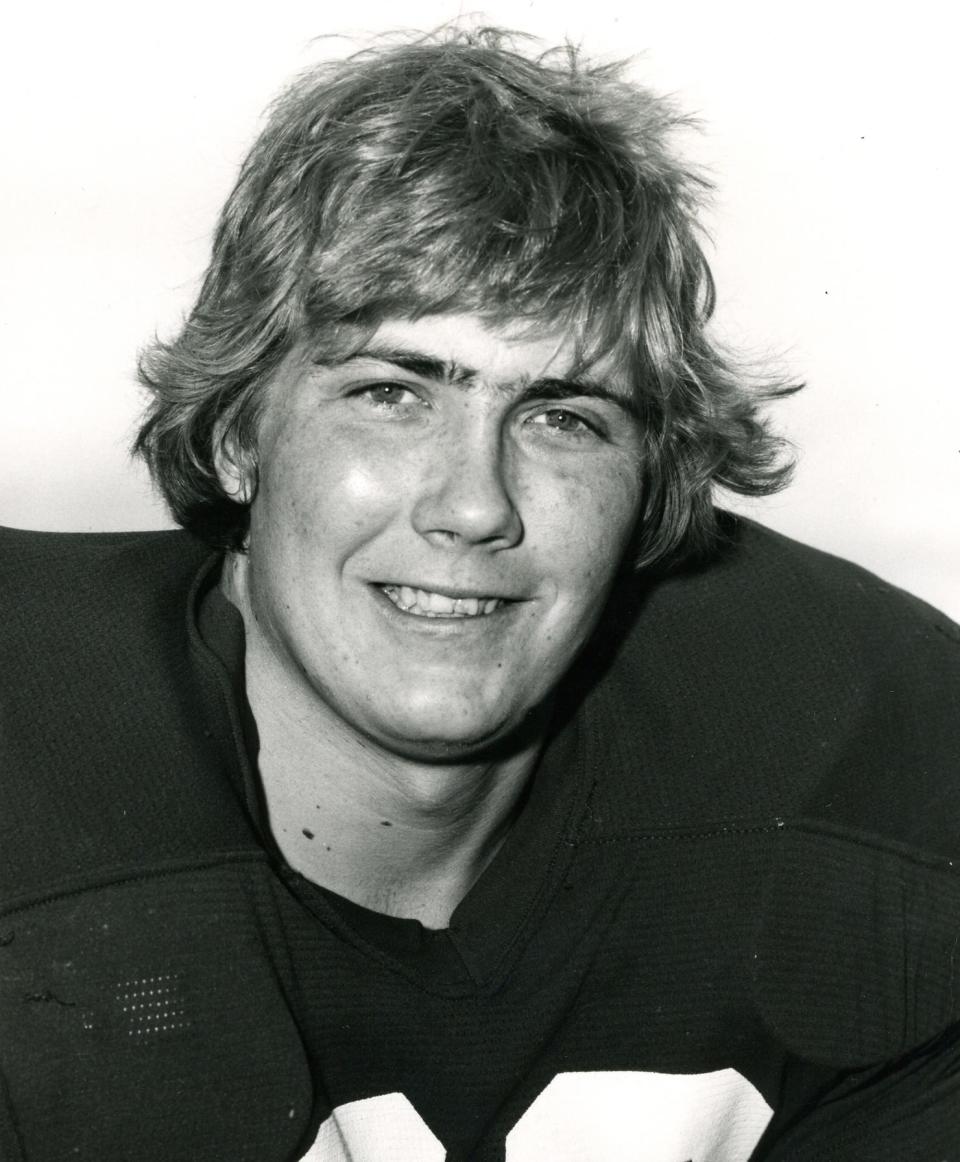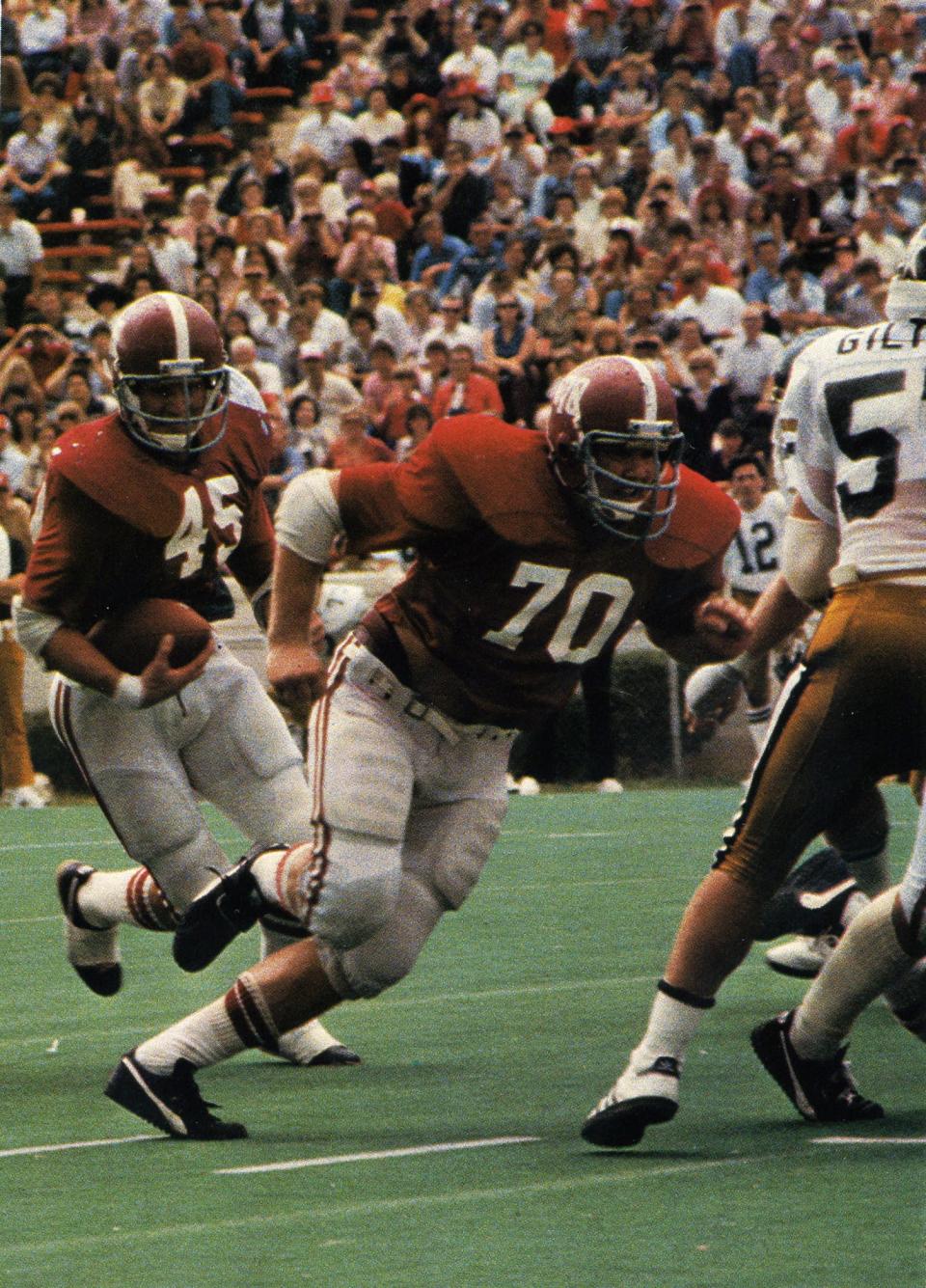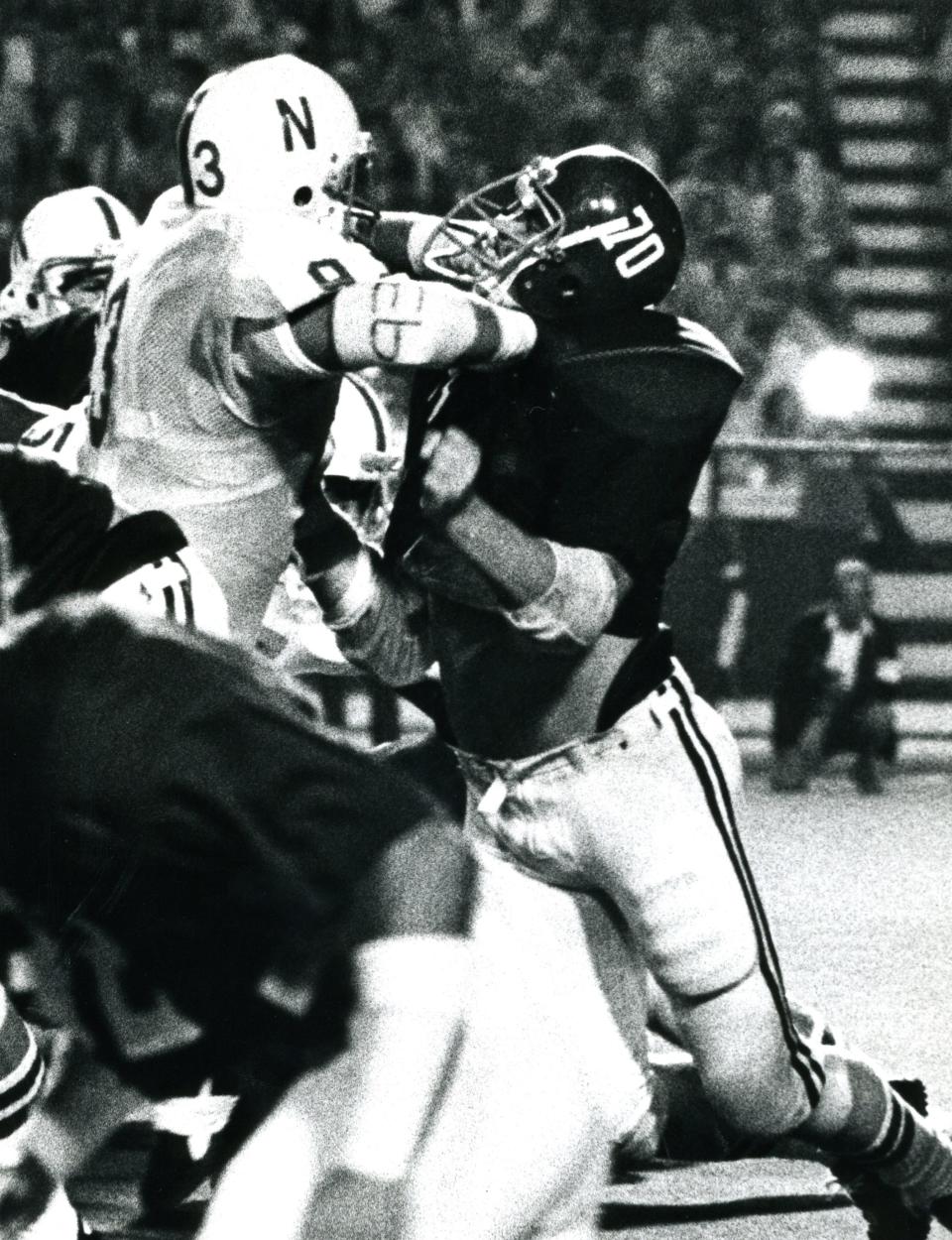Bear Bryant helped launch his law career. Now Mike Brock helps Alabama as a trustee
The interview was about to wrap up after 54 minutes. Mike Brock had been sitting across the table, in town the week of the LSU game in November. The former Alabama football offensive lineman spent almost an hour sharing old stories.
Right before the conversation ended, he apologized. “I broke my Coach Bryant rule about being direct and speaking in short sentences,” Brock said. The late Paul W. "Bear" Bryant didn’t have a lot to say, but when he spoke, everyone in the room listened to every word. Brock learned that while going from a walk-on to a two-year starter, winning two national championships in 1978 and 1979.
“I have a tendency, as all lawyers do, to talk too much,” Brock said. “I probably should have learned more from him for that.”
That lesson didn’t sink in for Brock, but he still learned plenty from Bryant. Bryant’s coaching helped him in not only in football but also Brock’s legal career as a nationally-recognized trial lawyer. The assistance spanned past coaching, though.
Bryant played a direct, and indirect, role in launching the Montgomery native’s legal career.
Bryant's investment is ultimately helping UA four decades later. Brock’s successful legal career has led him to a spot on the UA System Board of Trustees, where he is now the chair of the athletics committee and vice chair of the legal affairs committee.
He’s also a vital trustee in the ever-changing state of college athletics and NIL. Brock’s background in litigation makes him a valuable resource and voice in the room with plenty of uncertainty as to what NIL will look like in the next few years.
Without Bryant, it all might not have been possible.

NICK SABAN, NATE OATS: Picture Nick Saban the point guard and Nate Oats the wide receiver ― it actually happened
JIM WILSON: Remembering trustee Jim Wilson, an integral builder of the Alabama football dynasty
‘Don’t we have a law school here?’
Brock was getting ready to move to Birmingham with his wife Tammy. He had been admitted to the Cumberland School of Law at Samford the next semester. Brock didn’t know how he would pay for it, but if he wanted to practice law, that was his option for a place to study it.
Then a meeting with Bryant changed everything.
Brock, who had spent the previous season as a graduate assistant with Alabama football, went to see Bryant early in the summer of 1981. In previous conversations, Bryant had told Brock he wasn’t going to have a coaching position open for him, so Brock went to tell Bryant goodbye and that he would be going to law school in Birmingham.
“Well don’t we have a law school here?” Bryant asked, per Brock’s recollection.
Yes sir, UA does, Brock replied. But Brock hadn’t been admitted to UA yet. Bryant proceeded to make some jokes and then Brock said his goodbyes.
A few weeks later, Brock hadn’t yet moved to Birmingham, but the day was getting closer. Then Brock got a call. The UA law school wanted to interview him. He took it. Then a few weeks after the interview, Brock was admitted to UA law.
“He never told me he called the law school and asked them to give me an interview,” Brock said, “but I always suspected that he did.”

Call Oklahoma
By the time the first Christmas break arrived, Brock was broke.
“We didn’t have $20 in our bank account,” Brock said.
He needed help, so he decided to go visit Bryant. Brock didn’t schedule an appointment, though. None of the players, coaches or staffers really did, Brock explained. They didn’t knock on his door either. The basic approach was to move up and down the hall until Bryant popped out.
“None of the assistant coaches made fun of you because they knew what you were doing,” Brock said. “Sometimes they would be out there strolling.”
So Brock walked up and down the hall one day, then Bryant emerged. Brock asked if he had a minute. Bryant said sure. Brock explained his situation.
“If there’s anything I can do, come back and coach again, anything else I can do with the athletic department, really I need some help financially to keep the law school thing going,” Brock told Bryant.

The coach did have something for the former All-SEC offensive guard, actually. Bryant needed someone to help with his taxes and finances. He offered that to Brock and said he would pay him a little something and work out a deal for a scholarship.
However, Brock turned him down. Brock had a bachelor’s degree in business and commerce, but he had only taken two accounting classes.
“It wasn’t really until about a year later I kind of put it together that he wasn’t really asking me to be his financial person, but what he probably had in mind is that I would keep up with his receipts, make sure the accountants got those,” Brock said. “When he described it, I didn’t take it for ‘I’m going to make a job for you.’ I took it as, ‘Oh, you really want me to do this? I need to tell you I’m not qualified.’”
Once Brock turned him down for the initial offer, Bryant said he needed to think whether there was something else. Come back tomorrow, Bryant requested.
Then Brock did. He walked up and down the hall again. Bryant emerged. Brock asked if he had a minute. Bryant said sure.
He’d been thinking about how he could use Brock. Come in and work for academic advisor Gary White, Bryant told Brock. Bryant would give Brock a little money and pay his books and tuition.
Bryant also had a first task for Brock to complete: He wanted Brock to find out what Oklahoma was doing; Bryant had been hearing about some new academic programs the Sooners had introduced, and he wanted Brock to get more details.
“I said, ‘Well how do I find out what they’re doing at Oklahoma?’” Brock recalled. “He said, ‘Call ‘em.”
So Brock did. He called and reached a receptionist in Norman.
“Hi, my name is Mike Brock,” Brock started. “I am calling on behalf of Coach Bryant and I would like to speak to the person in charge of academics.”
One moment please, the secretary said. Soon, Brock found out Oklahoma wasn’t doing anything Alabama wasn’t already doing.
“I think (Bryant) probably knew that,” Brock said.
Brock was off and rolling in his new gig.

Thanks, Coach Bryant
Bryant died in January 1983, shortly after he retired. At that point, Brock was still in law school. Ray Perkins took over as coach, but the deal with Brock didn’t change. So, Brock was able to finish law school.
That led to a degree in law and a career that has spanned almost four decades with a focus on product liability, mass tort and class action cases. Today, Brock has a national trial practice for Kirkland & Ellis LLP, with his offices in Washington, D.C., and Montgomery.
“Coach Bryant was a master in recognizing potential and having faith in people when he knew they were going to put the effort into it,” said Vince Boothe, a teammate of Brock’s at Alabama. “I think Coach Bryant knew off the bat, if Mike made up his mind he’s going to be a successful attorney, he’s going to be a successful attorney.”
Steadman Shealy, the former Alabama quarterback turned attorney, saw early promise in Brock when they attended law school together. “You could tell Mike was going to be a great lawyer,” Shealy said.
That's in part because of what Brock learned from Bryant. Preparation and attention to detail are high on that list. Both qualities are important in football and law. For example, instead of preparing all week for a football opponent, Brock has had to prepare exhibits and witnesses.
“(Bryant) would say, ‘Everybody on the team, when they get up on Saturday morning, they want to be a great player that week. But it’s not possible to do that if you haven’t put in the preparation during the week,’" Brock said. I don’t know how many times I heard him say that. You hear it enough when you’re young, you can’t get it out of your head. It becomes a part of who you are.”
It’s not that Brock gets up every morning thinking about Bryant’s advice. He doesn’t really have to, though. Bryant's lessons have stuck with Brock throughout his law career, but they take a backseat to what Bryant did for Brock. Bryant’s teachings wouldn’t have done much for Brock’s legal career if it never happened.
Bryant ensured it did.
When Brock was asked what he would tell Bryant all these years later if he could speak to him, Brock broke from his usual talking pattern. He didn’t tell a detailed-filled story, and there was no long-winded response. Instead, Brock answered with two words because that was all Brock could manage.
“Thank you.”
Nick Kelly is the Alabama beat writer for The Tuscaloosa News, part of the USA TODAY Network, and he covers Alabama football and men's basketball. Reach him at nkelly@gannett.com or follow him @_NickKelly on X, the social media app formerly known as Twitter.
This article originally appeared on The Tuscaloosa News: Alabama football: How Bear Bryant helped launch trustee's law career
